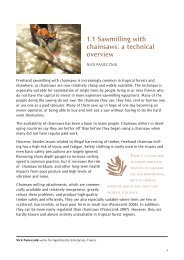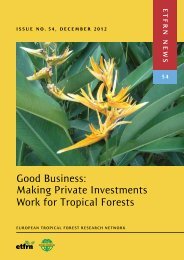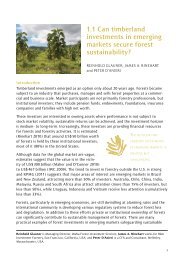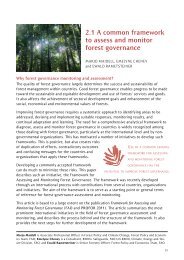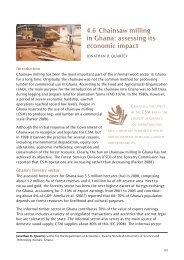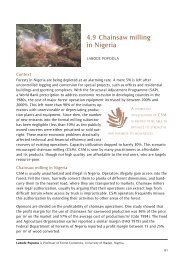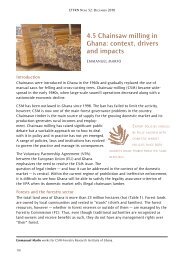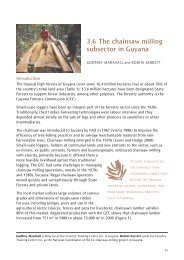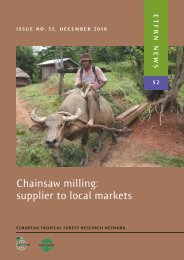Chainsaw milling: supplier to local markets - European Tropical ...
Chainsaw milling: supplier to local markets - European Tropical ...
Chainsaw milling: supplier to local markets - European Tropical ...
Create successful ePaper yourself
Turn your PDF publications into a flip-book with our unique Google optimized e-Paper software.
16<br />
ETFRN NEws 52: DEcEmbER 2010<br />
by 1985-86, the government had introduced a prohibitively high tariff on log export,<br />
making it economically unfeasible. This, along with a number of other measures such as<br />
the banning of sawn timber exports in 1989, forced indonesia’s forest industries <strong>to</strong> invest<br />
in manufacturing facilities. within a few years, indonesia had become the world’s largest<br />
producer of tropical plywood. The industry peaked by 1989–90, when more than 500<br />
concession companies were operating in indonesia’s natural forests and harvesting more<br />
than 27 million m 3 of logs per year.<br />
The development of a regula<strong>to</strong>ry framework paralleled the expansion of the concession<br />
system. The TpT 1 silviculture and administration system, introduced in 1970, gradually<br />
changed in<strong>to</strong> the TpTi 2 system in 1993 and became the centrepiece of the regula<strong>to</strong>ry<br />
framework. successive forest ministers introduced additional laws, regulations and guidelines.<br />
by the mid-1990s, forest concessions had <strong>to</strong> comply with complex procedures arising<br />
from an estimated 69 forestry laws, decrees and regulations governing the management<br />
and administration of natural forests (bennett 2001).<br />
This rapid expansion of the regula<strong>to</strong>ry framework did not ensure the sustainable management<br />
of the country’s natural forests. During the decade from 1985 <strong>to</strong> 1995, while the<br />
number of concession forest regulations more than doubled, forest cover declined by 16%<br />
(bennett 2001). by 2005, the number of concessions had<br />
declined <strong>to</strong> approximately 259, fewer than 100 of which<br />
were known <strong>to</strong> be actively managing their concession areas.<br />
most of this decline resulted from companies exhausting<br />
their concessions and pulling out of the timber business or<br />
having their licences revoked for failing <strong>to</strong> conform <strong>to</strong> even<br />
the most basic principles of sustainability.<br />
meanwhile, indonesia’s forests have shrunk rapidly. some of<br />
this reduction in forest area has been deliberately planned;<br />
for example, government policies aim <strong>to</strong> convert most of sumatra’s lowland forests <strong>to</strong><br />
pulp plantations, oil palm or other uses. The transmigration programme, 3 <strong>to</strong>gether with a<br />
rapidly increasing population, rapidly consumed much of the country’s remaining lowland<br />
forest areas. unregulated logging and poor practices added <strong>to</strong> the rapid loss of natural<br />
forests.<br />
log supply<br />
at the peak of production in 1989–90, annual cutting targets from the country’s natural<br />
forests were more than 20 million m 3 /year. by 2002, the annual harvested volume had<br />
been reduced <strong>to</strong> approximately 12 million m 3 /year in an indirect attempt <strong>to</strong> downsize the<br />
industrial overcapacity in the forestry sec<strong>to</strong>r and <strong>to</strong> establish the basis for a more sustainable<br />
industry. The biggest single reduction in annual cutting targets came in 2003 when<br />
the government slashed the annual quota from 12 million <strong>to</strong> 6.89 million m 3 in a single<br />
year. it was further reduced <strong>to</strong> 5.74 million m 3 in the following year. There was much talk<br />
of this being a positive step, although it is difficult <strong>to</strong> see how anyone, either the government<br />
or the industry, benefited from this dramatic reduction.



